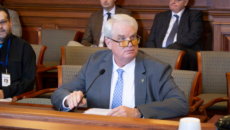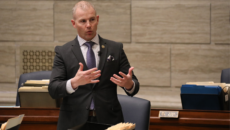JEFFERSON CITY, Mo. – A unanimous decision by the Missouri Supreme Court is giving new life to a controversial wind energy project.
The court on Tuesday decided to send the case back to the Missouri Public Service Commission after they determined that the regulatory body did not have the authority to deny approval, saying it was up to the PSC to “determine whether Grain Belt’s proposed utility project is necessary or convenient for the public service.”
The judges wrote that the PSC had erred in using the ruling in a similar but unrelated case, a case involving ATXI in which the Missouri Court of Appeals had ruled that utilities need to get county assent for projects before the PSC could give approval.
The difference lies in the applications filed by the companies. ATXI had sought an area CCN, while Grain Belt asked for a line CCN. The Appeals Court did not establish a delineation between the two, though the two permits are worded differently in the statute.
“This Court cannot ignore words in a statute and must give meaning to every word used,” judges wrote.
It’s a major win for Grain Belt and renewable energy advocates, who celebrated the court’s decision on Tuesday.
“Today’s unanimous ruling means Missourians are closer than ever to benefiting from the clean, affordable energy and economic boost this transformational infrastructure project will deliver to the Show-Me-State,” Clean Line Energy President Michael Skelly said in a statement. “The Missouri Public Service Commission previously determined that the Grain Belt Express is in the State’s best interest because it would save Missourians more than $10 million annually on their electric bills, create thousands of jobs, and provide millions in taxes to local communities into perpetuity. We are now turning our efforts to expediting approval from the Missouri Public Service Commission of this critical infrastructure project so that Missouri can realize these benefits as soon as possible.
“The Missouri Supreme Court provided clear and helpful guidance in its decision as to the differing roles of the Missouri Public Service Commission and the counties, finding that the relevant statute under which Grain Belt Express had applied “does not purport to give counties the authority to stand in the shoes of the Commission in determining whether a proposed utility project is in the public interest of the state or whether a utility should be granted a CCN.” The role of determining the public interest of a project under the relevant section of the statute thus rests with the Commission. The Court also affirmed that county assents will be required prior to construction. Clean Line looks forward to obtaining the required assents and acknowledges and respects both roles.
“We want to thank the tremendous broad-based support we’ve received from across Missouri, including local communities that have signed up for the power, the business community, organized labor, as well as energy consumers of all sizes. We look forward to working with other utilities and consumers to facilitate access to some of our country’s lowest cost wind resources.
“States that have embraced clean, affordable energy like that which will be delivered by the Grain Belt Express are already seeing a tremendous advantage in new local investments and lower electricity prices for their businesses and residents. Clean Line Energy is excited to make this a reality for Missourians.”
Renew Missouri Director James Owen also issued a statement following the decision.
“In the 7-0 vote announced today, the Missouri Supreme Court ruled in favor of not only clean energy for the state of Missouri but for a more prosperous economy. While this case has lingered in limbo for years as our neighbor states like Iowa and Illinois have passed us by, this puts the Show-Me State back on the map for wind energy by giving municipal utility companies all over the state more options in how they can best serve their customers’ power needs.
“The Grain Belt Express has taken many forms in getting to this point. Renew Missouri wants to applaud Clean Line for having the foresight to team up with city governments’ in and around the proposed area. This way, hundreds of thousands of Missouri residents and businesses have the option of sustainable energy. The legal teams representing the company as well as the municipal public utilities, including former Governor Jay Nixon, were committed to getting the right decision for Missouri’s public interests. But its also important to note that our own team – led by Andrew Linhares and Great Rivers Environmental Law Center’s Henry Robinson – were top-notch and indispensable in the ultimate success of the case.
“This is a complicated matter and passions run deep on both sides. I was born and raised on a farm and understand the value for one’s property rights. But the law is the law. Emotions cannot change that. It is Renew Missouri’s position that regulators were misapplying statutes as the Legislature had written them. Renew Missouri felt the same way about the case law developed by the appellate courts up to this point. But the Eastern District Court out of St. Louis and the Supreme Court got it right. It is our hope that this decision signals Missouri can finally move into the 21st century.
“Lots of resources were poured into fighting off this progress. We will probably never know who funded the efforts to defeat the Grain Belt Express or how much dark money was used. But the great thing about our state government is we have an appellate system untouched by unseemly political calculations. Our courts, as they are composed today, only care about doing the right thing and not the powerful interests looking to undermine the public. Renew Missouri looks forward to working with the Public Service Commission (“PSC”) as well as municipal governments to make sure the Grain Belt Express lives up to its promise of clean energy and a new, robust economic development tool.“
“We are very pleased with the Supreme Court’s decision,” said Duncan Kincheloe, President and General Manager of the Missouri Public Utility Alliance. “Municipal utilities are encouraged by this decision, especially coupled with the earlier findings of the Public Service Commission recognizing the substantial benefit this project brings to electric customers in the state.”
The project is still far from being fully realized, and the decision acknowledges that Grain Belt would need county assent to begin construction if approved by the PSC.
